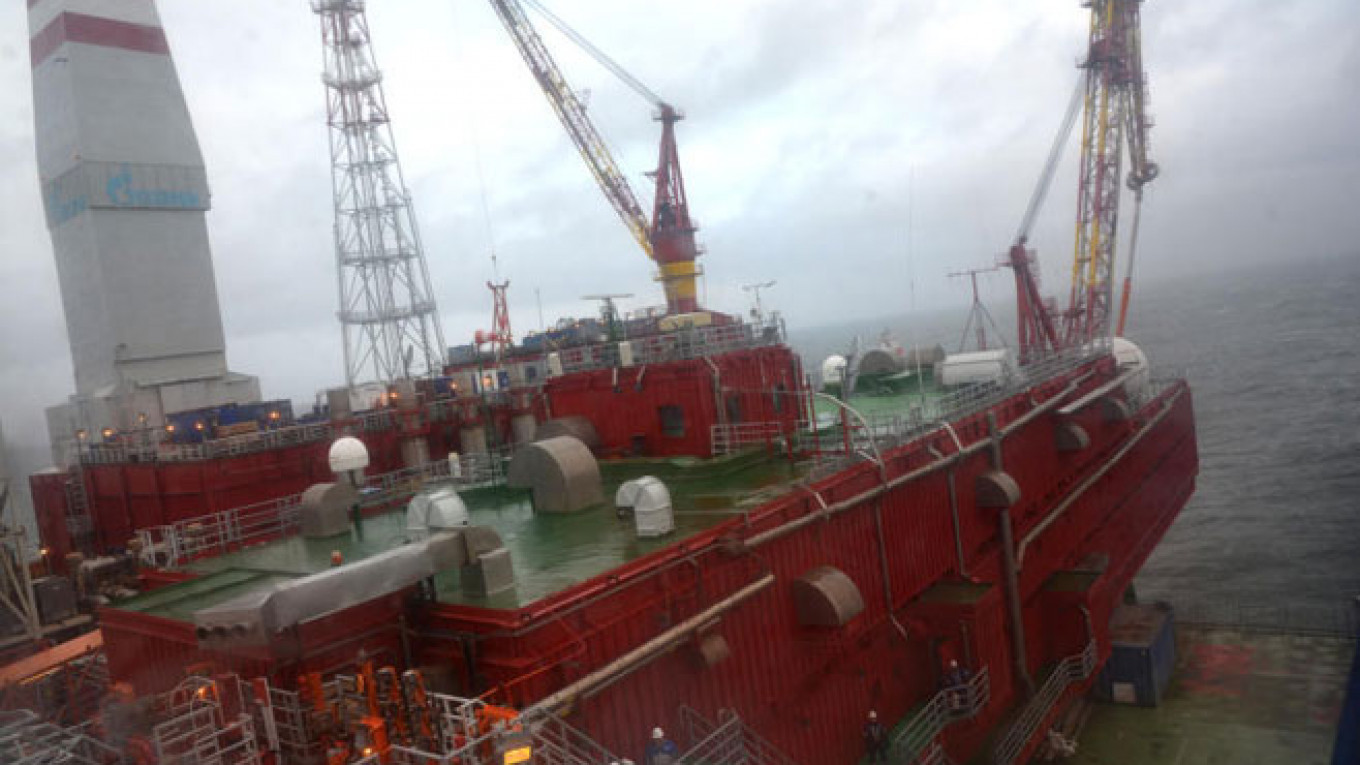A Gazprom oil rig was damaged by a storm in the Arctic Pechora Sea, maritime news agencies reported this week.
No casualties were reported, and the company denied that there had been any such incident.
But the story revived the ghost of past, deadlier Arctic disasters, prompting environmentalists once again to question the safety of oil exploration in the inhospitable polar seas.
A lifeboat was lost and a helipad damaged when the jack-up rig Saturn was struck by a storm last Saturday, according to a report released Wednesday by Lloyd's List Intelligence, a maritime business information service.
Initial reports, including Lloyd's, claimed that the crew had been evacuated in the wake of the incident.
But the State Marine Rescue Service said in e-mailed comments that the crew had returned to the vessel, which is currently moored by Cape Kanin Nos, taking shelter from the storm.
Gazprom's subsidiary Gazprom Neft, which chartered the Romanian-owned rig, confirmed to The Moscow Times that the crew had been partially evacuated and towing had been suspended.
But all safety measures were part of a routine practice, and the vessel is on track to the port of Murmansk, the company said in a written statement.
"There were no incidents or disasters at the jack-up rig," Gazprom Neft's press service said Wednesday.
Arctic watchers have good reason to be jumpy: In 2011, another oil rig used by Gazprom Neft, the Kolskaya, sank in the Sea of Okhotsk during towing, killing 53 crew members.
The Saturn, handled by three professional tugboats from Norway, is in a better position than the Kolskaya, which had been towed by icebreakers that were poorly suited for towing, said Mikhail Voitenko, editor-in-chief of news website the Maritime Bulletin.
Environmental activists say the technology simply does not yet exist to make oil exploration in the Arctic safe for crews and the environment.
This is not necessarily the case for oil rigs, said Voitenko: Barring ice in the water, the conditions in the Arctic are much different than in the rest of the world's oceans, where drilling platforms are widely used. In the north, the rigs are withdrawn to port before the ice sets, nullifying the problem.
But Greenpeace says rigs in the Arctic are plagued by incidents. The same year tragedy struck aboard the Kolskaya, another Gazprom oil rig in the Pechora Sea, the Prirazlomnaya, lost an accommodation ladder to the storm. In 2013, Shell's drill barge Kulluk had to be scrapped after it lost its tug and was grounded on the shore of Alaska.
"We're just not ready yet to explore the Arctic shelf," Yulia Pronina of Greenpeace Russia told The Moscow Times on Thursday.
Furthermore, the technology does not yet exist to clean up oil spills in the icy seas, critics say, though towed oil rigs pose no spill hazard.
Russian state-run petroleum companies Gazprom and Rosneft began pushing for Arctic exploration in the 2010s.
Lacking the requisite technologies, they enlisted the help of Western corporations, including Shell and ExxonMobil. But the recent Western sanctions against Russia, which curbed exports of shelf drilling equipment to Russia, as well as the sliding oil prices, have cast a pallor over the country's Arctic expansion efforts.
Greenpeace has staged protests against Gazprom's Arctic operations, including on the Saturn earlier this year and the Prirazlomnaya in 2013. The Prirazlomnaya protest landed 30 activists in Russian custody for months, though they were eventually amnestied.
Contact the author at [email protected]
A Message from The Moscow Times:
Dear readers,
We are facing unprecedented challenges. Russia's Prosecutor General's Office has designated The Moscow Times as an "undesirable" organization, criminalizing our work and putting our staff at risk of prosecution. This follows our earlier unjust labeling as a "foreign agent."
These actions are direct attempts to silence independent journalism in Russia. The authorities claim our work "discredits the decisions of the Russian leadership." We see things differently: we strive to provide accurate, unbiased reporting on Russia.
We, the journalists of The Moscow Times, refuse to be silenced. But to continue our work, we need your help.
Your support, no matter how small, makes a world of difference. If you can, please support us monthly starting from just $2. It's quick to set up, and every contribution makes a significant impact.
By supporting The Moscow Times, you're defending open, independent journalism in the face of repression. Thank you for standing with us.
Remind me later.







